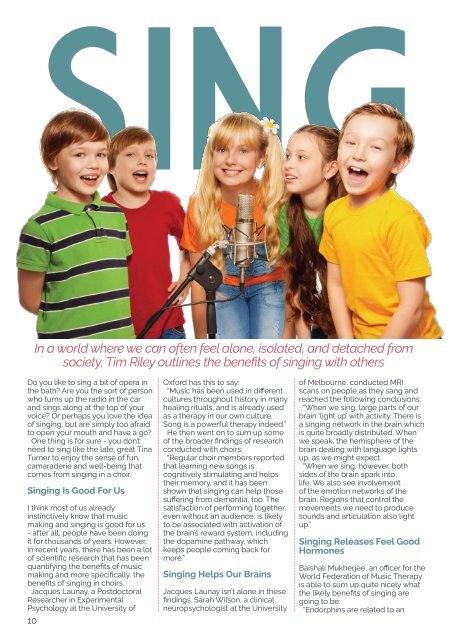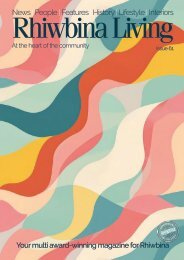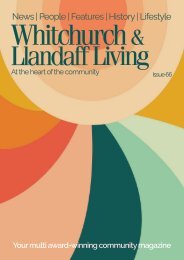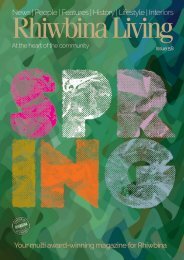Rhiwbina Living
Summer 2023 issue of Rhiwbina Living, the award-winning magazine for Rhiwbina.
Summer 2023 issue of Rhiwbina Living, the award-winning magazine for Rhiwbina.
- TAGS
- wales
- whitchurch
- rhiwbina
- cardiff
Create successful ePaper yourself
Turn your PDF publications into a flip-book with our unique Google optimized e-Paper software.
SING<br />
In a world where we can often feel alone, isolated, and detached from<br />
society, Tim Riley outlines the benefits of singing with others<br />
Do you like to sing a bit of opera in<br />
the bath? Are you the sort of person<br />
who turns up the radio in the car<br />
and sings along at the top of your<br />
voice? Or perhaps you love the idea<br />
of singing, but are simply too afraid<br />
to open your mouth and have a go?<br />
One thing is for sure - you don’t<br />
need to sing like the late, great Tina<br />
Turner to enjoy the sense of fun,<br />
camaraderie and well-being that<br />
comes from singing in a choir.<br />
Singing Is Good For Us<br />
I think most of us already<br />
instinctively know that music<br />
making and singing is good for us<br />
- after all, people have been doing<br />
it for thousands of years. However,<br />
in recent years, there has been a lot<br />
of scientific research that has been<br />
quantifying the benefits of music<br />
making and more specifically, the<br />
benefits of singing in choirs.<br />
Jacques Launay, a Postdoctoral<br />
Researcher in Experimental<br />
Psychology at the University of<br />
10<br />
Oxford has this to say:<br />
“Music has been used in different<br />
cultures throughout history in many<br />
healing rituals, and is already used<br />
as a therapy in our own culture.<br />
Song is a powerful therapy indeed.”<br />
He then went on to sum up some<br />
of the broader findings of research<br />
conducted with choirs:<br />
“Regular choir members reported<br />
that learning new songs is<br />
cognitively stimulating and helps<br />
their memory, and it has been<br />
shown that singing can help those<br />
suffering from dementia, too. The<br />
satisfaction of performing together,<br />
even without an audience, is likely<br />
to be associated with activation of<br />
the brain’s reward system, including<br />
the dopamine pathway, which<br />
keeps people coming back for<br />
more.”<br />
Singing Helps Our Brains<br />
Jacques Launay isn’t alone in these<br />
findings. Sarah Wilson, a clinical<br />
neuropsychologist at the University<br />
of Melbourne, conducted MRI<br />
scans on people as they sang and<br />
reached the following conclusions:<br />
“When we sing, large parts of our<br />
brain ‘light up’ with activity. There is<br />
a singing network in the brain which<br />
is quite broadly distributed. When<br />
we speak, the hemisphere of the<br />
brain dealing with language lights<br />
up, as we might expect.<br />
"When we sing, however, both<br />
sides of the brain spark into<br />
life. We also see involvement<br />
of the emotion networks of the<br />
brain. Regions that control the<br />
movements we need to produce<br />
sounds and articulation also light<br />
up.”<br />
Singing Releases Feel Good<br />
Hormones<br />
Baishali Mukherjee, an officer for the<br />
World Federation of Music Therapy<br />
is able to sum up quite nicely what<br />
the likely benefits of singing are<br />
going to be:<br />
“Endorphins are related to an

















